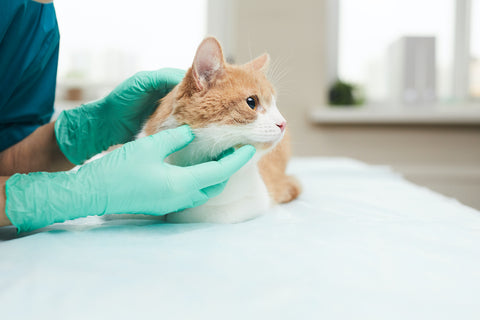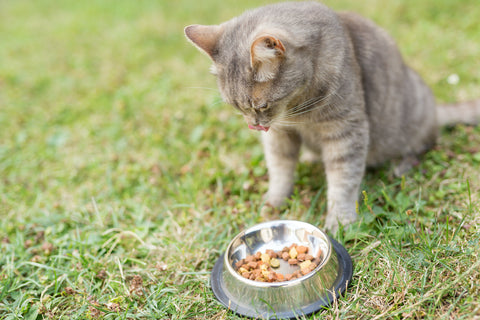Why is My Cat Throwing Up? Common Causes and What You Can Do
The act of vomiting in cats is a common concern for many pet owners. It can be a result of various factors, ranging from minor issues like hairballs to more serious health problems. Understanding the underlying reasons for your cat's vomiting is crucial for ensuring their well-being.
In this article, we'll delve into the common causes of cat vomiting, how to differentiate between harmless episodes and those requiring immediate attention, and what you can do to help your furry companion. By the end, you'll be better equipped to address the question, "Why is my cat throwing up?" and provide the best care for your beloved pet.

Unraveling the Reasons Behind Cat Vomiting
Cats and Vomiting
Hairballs:
Regular grooming can significantly reduce the formation of hairballs. Brush your cat's fur to remove loose hair. There are also specialized cat foods and treats designed to help control hairball formation.
If your cat is experiencing frequent hairballs, you can consider over-the-counter hairball remedies or consult your vet for recommendations.
Dietary Issues:
Maintain a consistent diet for your cat. If you need to change their food, do so gradually over a week or two to avoid stomach upset.
If dietary issues are causing vomiting, return to your cat's previous diet and gradually transition to the new one. Ensure the new food is appropriate for their age, health, and dietary needs.
Gastrointestinal Infections:
Ensure your cat is up-to-date with vaccinations and practice good hygiene to minimize exposure to contagious infections.
If you suspect an infection, consult your vet for a proper diagnosis. Treatment may involve antibiotics, fluids, and supportive care.
Foreign Objects:
Keep small objects, like hair ties or rubber bands, out of your cat's reach. Supervise playtime to prevent ingestion of inappropriate items.
If you suspect your cat has ingested a foreign object, never attempt to remove it yourself. Seek immediate veterinary care for a professional evaluation and potential surgical intervention.
Allergies:
Identify and avoid the specific allergen responsible for the reaction. Your vet may recommend hypoallergenic diets or tests to pinpoint the allergen.
If your cat has food allergies, your vet will recommend a hypoallergenic diet or treatment plan to manage the allergy.
Motion Sickness:
Gradual exposure to car rides, offering treats during trips, and using carriers can help alleviate motion sickness.
For severe cases, consult your vet for medications or techniques to reduce motion sickness.
Stress and Anxiety:
Cats can be sensitive to changes in their environment or routine, which can lead to stress-related vomiting. Identifying and mitigating stressors, such as introducing a new pet or moving to a new home, is essential.
Utilize pheromone diffusers or calming products to help reduce anxiety. Establish a consistent and enriching environment for your cat to reduce stress levels.
Overeating:
Cats can sometimes overindulge in their food, leading to vomiting. Ensure portion control and follow feeding guidelines provided on the cat food packaging.
Split your cat's meals into smaller, more frequent portions to help prevent overeating.
Poisoning or Toxins:
Some common household items and plants can be toxic to cats and cause vomiting. Keep your home cat-proof by removing access to poisonous substances.
If you suspect your cat has ingested a toxic substance, contact your veterinarian or an emergency animal poison control hotline immediately.
Inflammatory Bowel Disease (IBD):
IBD is a chronic condition that can cause vomiting and other digestive issues in cats. Diagnosis often involves biopsies, and treatment may include specialized diets and medications.
Consult your vet if your cat experiences persistent digestive problems or unexplained weight loss.
Liver or Pancreatic Issues:
Liver or pancreatic diseases can result in vomiting. Symptoms may include jaundice, changes in appetite, and lethargy.
Early detection and treatment are crucial, so consult your veterinarian if you suspect liver or pancreatic issues.
Diabetes:
Cats can develop diabetes, and one of the symptoms can be vomiting. Other signs include increased thirst and urination, weight loss, and changes in appetite.
Regular check-ups can help catch diabetes early, and your vet can provide guidance on treatment and management.
Infections and Parasites:
Internal parasites like worms and external parasites like fleas can cause vomiting. Ensure your cat is on a regular deworming and flea control regimen.
Consult your vet if you suspect your cat has an infection or parasite infestation.
Age-Related Changes:
As cats age, they may experience age-related conditions that lead to vomiting, such as kidney disease. Regular senior check-ups are important to monitor and manage these issues.
In conclusion, while cat vomiting can be common and often resolves on its own, it's crucial to pay attention to the frequency, severity, and accompanying symptoms. If your cat's vomiting is persistent, severe, or accompanied by other concerning signs, consulting your veterinarian is the best course of action to ensure your feline friend's health and well-being.

Why Your Cat Vomits After Eating
If your cat consistently vomits shortly after eating, it's important to address this issue to ensure your cat's health and well-being. There can be various reasons why a cat vomits after eating, and it may be related to their diet, eating habits, or an underlying health condition.
Here are some common causes and steps to address this issue:
Eating Too Quickly:
Some cats may eat their food too quickly, leading to vomiting. This can be especially common in multi-cat households where competition for food is high.
Try feeding your cat smaller, more frequent meals to encourage slower eating. You can also use specialized feeding bowls designed to slow down eating.
Food Allergies or Sensitivities:
Food allergies or sensitivities can cause gastrointestinal upset and vomiting. If you suspect this, consult your vet to determine if a dietary change is needed.
Your vet may recommend switching to a hypoallergenic or easily digestible cat food to see if the vomiting stops.
Inappropriate Diet:
Ensure that you're feeding your cat a high-quality cat food that meets their nutritional needs. Low-quality or inappropriate diets can lead to digestive issues.
Consult with your vet to choose the right type of food based on your cat's age, health, and dietary requirements.
Overeating:
Overeating can result in vomiting. Ensure you're providing appropriate portion sizes based on your cat's weight and activity level.
Split meals into smaller, more frequent portions to prevent overeating.
Gastrointestinal Issues:
Underlying gastrointestinal problems, such as inflammatory bowel disease (IBD) or infections, can cause vomiting. Your vet can diagnose and treat these conditions.
If vomiting persists or is accompanied by other symptoms like diarrhea or weight loss, consult your vet for a thorough evaluation.
Dental Problems:
Dental issues can make eating uncomfortable for your cat, causing them to vomit.
Regular dental check-ups and dental care can help ensure your cat's teeth are in good condition.
Stress or Anxiety:
Cats may vomit due to stress or anxiety, especially if mealtime is a source of tension.
Create a calm feeding environment, and consider using pheromone diffusers to reduce stress.
Foreign Objects:
Ingesting non-food items like hair ties or string can lead to vomiting. Keep these items out of your cat's reach.
If you suspect an ingested foreign object, consult your vet.
If your cat's vomiting persists or is accompanied by other concerning symptoms, consult your veterinarian for a thorough examination and proper diagnosis. Your vet will be able to provide specific guidance based on your cat's unique situation, which may include dietary changes, medical treatment, or other interventions to address the underlying cause of the vomiting.
Leave a comment
